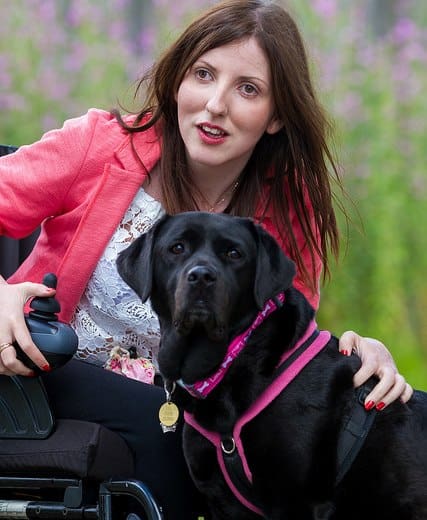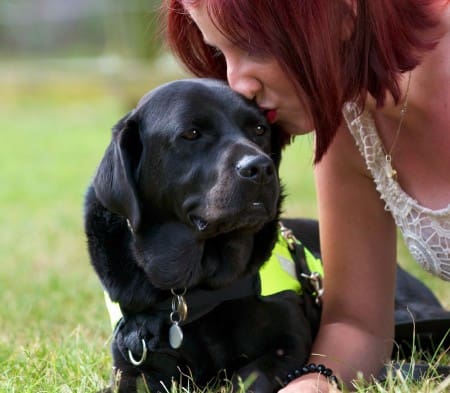Demi Shakespeare has a BSc in Counselling Psychology, is a prolific fundraiser, and loves her dog. Oh, and she uses a wheelchair.
Diagnosed with cerebral palsy at a young age, Demi uses a wheelchair to overcome movement and coordination difficulties caused by the condition. She finds the chair makes her appear more vulnerable, but discovered a way to utilise this to help others. With the help of working dog, Bumble, Demi no longer lets her wheelchair define her existence.

From wallflower to working dog champion
It seems Demi was always destined to make her mark in mental health. At secondary school, she won awards for her work as a member of the school’s anti-bullying support team. Demi was well-suited to the role because of her kind and determined nature, but her wheelchair became a barrier to self-belief.
Before assistance dog, Bumble, came along, Demi was reliant on her Mum for support. Usually, she found people didn’t look beyond her chair and often ignored her. People asked Demi’s Mum what was wrong and showed sympathy, but it was unwanted.
In the end, it became far easier to let her Mum do the talking, but Demi craved the societal acknowledgment that so many of us take for granted. The chair means you are “different to those around you,” she explains, and resentment builds.
Demi didn’t want her wheelchair to appear in photos; she felt “judged” by it.
At school, Demi didn’t make a fuss when using a wheelchair stopped her from joining in with her peers. She didn’t want her disability to be “noticed anymore than it had to be,” she admits.
But then Bumble came along.

Everything changed for Demi with a working dog by her side: “People stop and ask about her only to realise I’m the same as anyone without a disability,” she tells us, and this has increased her friendship circle. For the first time, she understands that friends are of no benefit if they don’t value you as a person.
Surrounded by the right people, Demi’s confidence grew. Now, she’ll stop and talk to anyone: “Why not?” she says, “I’m so proud of what me and Bumble have achieved together.” Bumble gives Demi a reason to get out and try things she never would have done before.
A change in perspective
Having a working dog has shown Demi that her wheelchair is a part of her and she accepts this more readily than ever before; she views her disability differently now because it brought Bumble into her life. Thankful for this, Demi says Bumble is “my everything.”
In return for new-found confidence that transforms her daily existence, Demi wants to build a better life for her and Bumble. She earned her degree at Worcester University and now offers an advice and support service, predominantly to those with mental health conditions. In time, Demi wants to run her own counselling service and believes that “just one person listening may be all that someone needs.”
Early on, she discovered having a wheelchair is an aide to her new career: “Individuals often share personal and very private information, which therefore opens up their vulnerabilities. My disability shows that I may have faced challenges in life and have overcome them. This means they will hopefully be more comfortable to share what is going on for them.”
Paying it forward
Outside of work, Demi finds those she speaks to about her disability and “princess” Bumble are fascinated to learn more about their life together.
Confident and happy now to draw attention to her own personal experiences, Demi holds events to raise money for Dogs for Good. She’s raised thousands for the charity by running food and cakes sales, offering face painting and beauty treatments at events, and giving away donated raffle prizes where Bumble draws out the winning tickets.
“It is so rewarding knowing that all the effort myself and Bumble put in together will eventually change someone’s life in the way that Bumble did for me,” she says.
Quite simply, Demi adds, “Bumble has shown me my worth.”